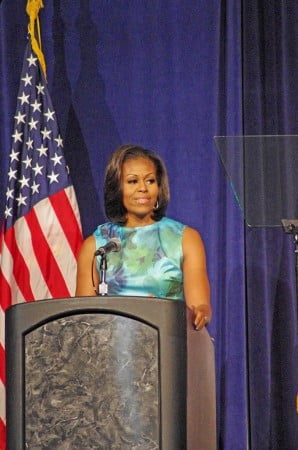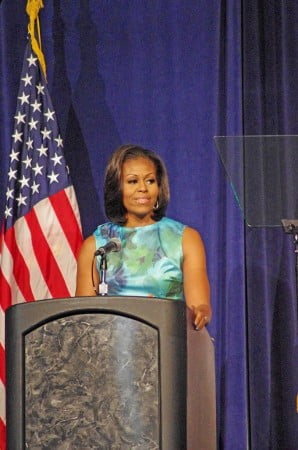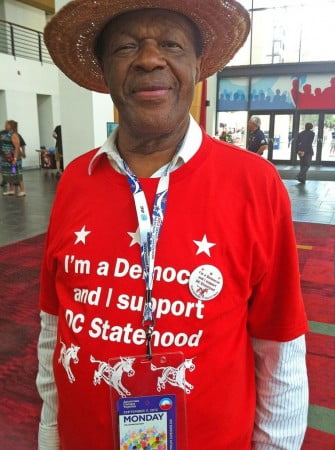Democrats Embrace Their Values During DNC Convention

Convention Theme is “Americans Coming Together”
By Moe White
The first night of their convention, the Democrats meeting in Charlotte this week took steps to change the debate. The second night, they affirmed that they are ready to fight this fall’s election using tools that their opponents have used against them for more than a generation.
Thirty years after the late Jerry Falwell’s ”Moral Majority” staked out “values voters” as a way to encourage conservative Democrats to support Republicans, the party of Roosevelt and Truman, Kennedy and Johnson, Carter and Clinton, seems at last determined to express, explain, and exploit its own values.
The contrast with the Republicans was stark. Most of the Democrats who spoke on Septemebr 5th were reared by parents of limited means who valued hard work and sacrifice. For the most part, they had no choice: they had to work hard to make ends meet, and they had to sacrifice to ensure that their children enjoyed better opportunities than they had. As a result, they expressed a kind of personal empathy with the “don’t-haves” that their GOP counterparts lacked, and they showed a determination to help those coming after them, rather than imply that America is a gated community where those who aren’t already inside the gates aren’t welcome.
In the words of First Lady Michelle Obama, “When you’ve worked hard, and done well, and walked through that doorway of opportunity…you do not slam it shut behind you…you reach back, and you give other folks the same chances that helped you succeed.”
The various speakers’ experiences embedded in each of them a belief in the American dream of steadily improved opportunities from generation to generation; each of them was the beneficiary of their parents’ and grandparents’ hopes for their future. As they described remembered struggles, they spoke with pride of their predecessors’ achievements and the joy and celebration their own accomplishments brought to their elders. These men and women embody an aspect of the American dream that is invariably overlooked by or even dismissed; and neither the dream nor the accomplishments belong to one person alone.
That awareness of a shared struggle, shared sacrifice, and shared achievements was well described by Lilly Ledbetter, who for nineteen years was paid less than men in her company who were doing the same work. When she finally learned of the pay discrepancy – which would also impact her Social Security benefits after she retired – she sued.
“We decided to fight for our family and to fight for your family too. We sought justice because equal pay for equal work is an American value. That fight took me ten years. It took me all the way to the Supreme Court. And, in a 5–4 decision, they stood on the side of those who shortchanged my pay, my overtime, and my retirement just because I am a woman.
“But,” she continued, “this fight became bigger than Lilly Ledbetter. Today, it’s about my daughter. It’s about my granddaughter. It’s about women and men. It’s about families. It’s about equality and justice.”
The first bill President Obama signed, nine days after taking office in January 2009, was the Lilly Ledbetter Fair Pay Act, passed by Congress specifically to overturn the Court’s misguided ruling. And, noted Ledbetter, “The president signed the bill for his grandmother, whose dreams hit the glass ceiling, And for his daughters, so that theirs never will. Because of his leadership, women who faced pay discrimination like I did will now get their day in court.”
But words like “equality” and “justice” can seem abstract to many voters. Who, after all, would not want both those benefits of living in America? Deval Patrick, who succeeded Mitt Romney as governor of Massachusetts, defined the values of his party in more specific terms.
“What do we believe? We believe in an economy that grows opportunity out to the middle class and the marginalized, not just up to the well connected. … We believe that we owe the next generation a better country than we found and that every American has a stake in that. We believe that in times like these we should turn to each other, not on each other. We believe that government has a role to play, not in solving every problem in everybody’s life but in helping people help themselves to the American dream.”
It was impossible not to contrast those sentiments with the self-praise of so many in the GOP. NJ Governor Chris Christie spoke at length about his forebears’ poverty and climb into affluence, and his own accomplishments once he gained power in his state – but said virtually nothing about helping anyone else achieve their goals.
Tammy Duckworth, an Iraq War veteran who lost both legs while piloting a helicopter there, discussed quite frankly how that safety net works. Her father, a Viet Nam veteran, could not find work for a time after he and his Chinese-Thai wife returned with Tammy to the United States.
“Dad’s work took us all over the world until he lost his job. It was a tough time. We used up our savings, moved into a studio apartment. But our family did the responsible thing and rolled up our sleeves. Mom took in sewing.
“My 55-year-old dad tried to find work. But at 15, I was the only one with a job—after school, for minimum wage. Thank God for the food stamps, public education, and Pell grants that helped me finish high school and college,” she said.
Even more than the testimony of the other speakers, the remarks by those closest to the president painted a picture of a man and the community that shaped him – a community that embodies them.
Brother-in-law Craig Robinson explained, “No matter how different we may seem, we share a set of values our parents gave us—values the same in Chicago as they are in Honolulu: a willingness to work hard, a commitment to education and the responsibility to look out for each other. They’re the values at the core of how Barack and Michelle have lived their lives, raised our nieces and led this country as president and first lady of the United States.”
And Michelle Obama described their lives as they were just beginning to know each other this way:
“When Barack started telling me about his family – that’s when I knew I had found a kindred spirit, someone whose values and upbringing were so much like mine … Barack and I were both raised by families who didn’t have much in the way of money or material possessions but who had given us something far more valuable – their unconditional love, their unflinching sacrifice, and the chance to go places they had never imagined for themselves.
“…They simply believed in that fundamental American promise that, even if you don’t start out with much, if you work hard and do what you’re supposed to do, then you should be able to build a decent life for yourself and an even better life for your kids and grandkids.
“That’s how they raised us … that’s what we learned from their example. We learned about dignity and decency – that how hard you work matters more than how much you make … that helping others means more than just getting ahead yourself.
“We learned about honesty and integrity – that the truth matters … that you don’t take shortcuts or play by your own set of rules … and success doesn’t count unless you earn it fair and square.
“We learned about gratitude and humility – that so many people had a hand in our success, from the teachers who inspired us to the janitors who kept our school clean…and we were taught to value everyone’s contribution and treat everyone with respect.
“Those are the values Barack and I – and so many of you – are trying to pass on to our own children. That’s who we are.”
The Democrats in Charlotte were determined to reclaim the word “values” as well as the actual values that they believe made America great. They have focused on the quality of being the “United” States, of standing as “one nation,” of uniting a vast, diverse community that relies on all its members to succeed and thrive. They understand that any weak link will destroy the chain, just as one person with untreated illness can infect the entire community. They recognize that all of us working together for the common goal of American prosperity makes us a stronger nation, while working selfishly for one’s own interests creates imbalances that will destroy our society.
As I pondered and reacted to the eloquent words of speakers who represented America in all its proud diversity, I could not help but recall the motto of The Three Musketeers: “All for One, One for All.” How well that fits with the motto found on all our coins and currency, E Pluribus Unum, and how well they both express the noble interdependence of generations of Americans who have built on the foundations laid by their fathers and their fathers’ fathers, their mothers and grandmothers, to achieve a dream that can be shared by all.
They were expressing a value that I recall from my own youth: to say “I am an American” embraces the highest aspirations of our heritage and the greatest hopes for our future – and the certainty that those aspirations are ours, not just mine, and those hopes belong to us, not just me. Finally, if our hopes and dreams are achieved, we all – not I alone – are responsible for that success.








